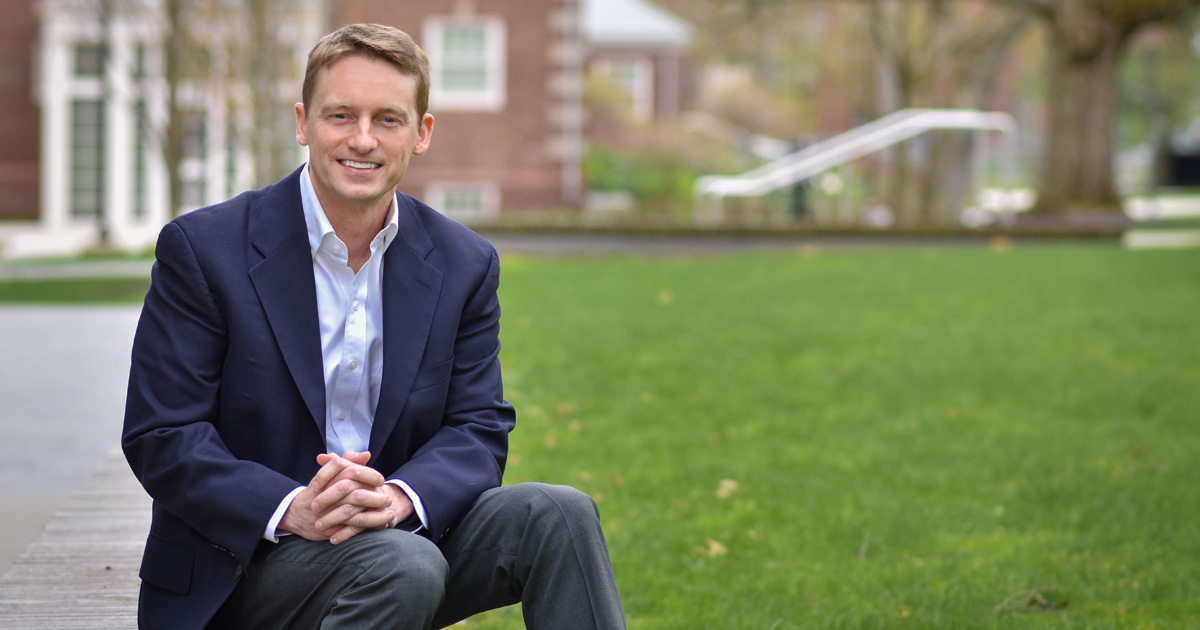To Tackle Challenges on Earth, Jonathan Sims Looks to Space

Dr. Jonathan Sims’ optimism is contagious.
In a typical conversation he’ll cheerfully jump from topics ranging from strategic problem solving, to interplanetary travel, to open innovation, all while quoting iconic changemakers throughout history. His energy is rooted by his admiration at humankind’s sheer innovation during the past century. “I am an unapologetic optimist,” says Sims. “I believe the world is getting better, not worse.”
Sims is an assistant professor of strategic management at Babson College, where he teaches business strategy courses. His research and teaching programs lie at the intersection of strategy, entrepreneurship, and open innovation. When so many of us are trying to make sense of a news cycle filled with clickbait headlines and negativity, Sims adamantly believes we must first fortify the right mindset.
“This generation has some tremendous challenges ahead. I’d say global warming are numbers one through five. But one of the things that I firmly believe is that these problems we’re all facing won’t be solved by pessimists.”
His fascination with strategy started at an early age within the education field. While his classmates focused on acing the next test, a young Sims was dissecting the institutional cogs and wheels of the education system. At 15 years old, he was elected as the student member of the Maryland State Board of Education and spent his free time sitting in on policymaking meetings about distributing public school resources. It was his first peek behind the scenes, and his interest in entrepreneurship as a learning discipline wasn’t far behind.
“Equipping students with Babson’s entrepreneurial mindset prepares young people to see challenges as opportunities—and not just opportunities for themselves, but for the world.”
Being an entrepreneur is hard work, as Sims experienced himself while working at a startup during the Wild West of the dot-com boom. So what else does a budding entrepreneur need besides grit? This is where Sims says, “Equipping students with Babson’s entrepreneurial mindset prepares young people to see challenges as opportunities—and not just opportunities for themselves, but for the world.”
Outrageous Goals
So how can we tackle these obstacles, even as they seem to be piling up faster than we’re able to conquer them? Sims thinks the answers may lie in the stars—specifically, space travel.
Sims explains that global expenditures around the space program have grown in the past five years, and global budgets for space exploration are projected to grow to more than $20 billion by 2027. This kind of ambition behind investing in space, Sims says, is exactly what the world needs. “We need these outrageous goals to bring us together as people. We haven’t had that in a long time.”
“We had to learn everything on how to do that,” says Sims. “What if as a society, we could do something like that again? What if the military-industrial complex became a scientific-industrial complex? What if the same engineers working on weapons, worked on how we get to Mars?”
But it’s not a trip to the red planet that Sims is after. It’s the innovation for our own world that happens in the wake of a tremendous, common goal. “The thing is, the lasers that were used to help the shuttle dock to the space station are the same lasers that were used to LASIK my eyes.”
Real-Life Connections
Before tackling interplanetary travel, Sims has one simple piece of advice for incoming students: Put down your phone.
It’s not the technology that bothers him. Sims is more concerned about the unhealthy habits that can be developed around only watching the highlights of people’s lives. “Teddy Roosevelt once said that comparison is the thief of joy,” says Sims. “Everyone has their good moments, but we should draw inspiration from entrepreneurs’ failures and how they dealt with those challenges.”
This summer, instead of staring at their screens, 95 young people from 23 countries will connect face to face while building business ventures and having late-night talks over pizza. They’ll have deep conversations with entrepreneurial educators and leaders. And when that many bright young minds are all immersed in learning, design thinking, and prototyping, something extraordinary is bound to happen.
Sims hopes that what students take away is the power of human connectivity and a shared optimism. Summer Study should be a time for students to relax, to learn, and to have fun. “I hope this summer is a chance for students to learn not only about entrepreneurship, but about themselves.”
Posted in Entrepreneurial Leadership, Insights
